Can a Massage Gun Help a Pinched Nerve?
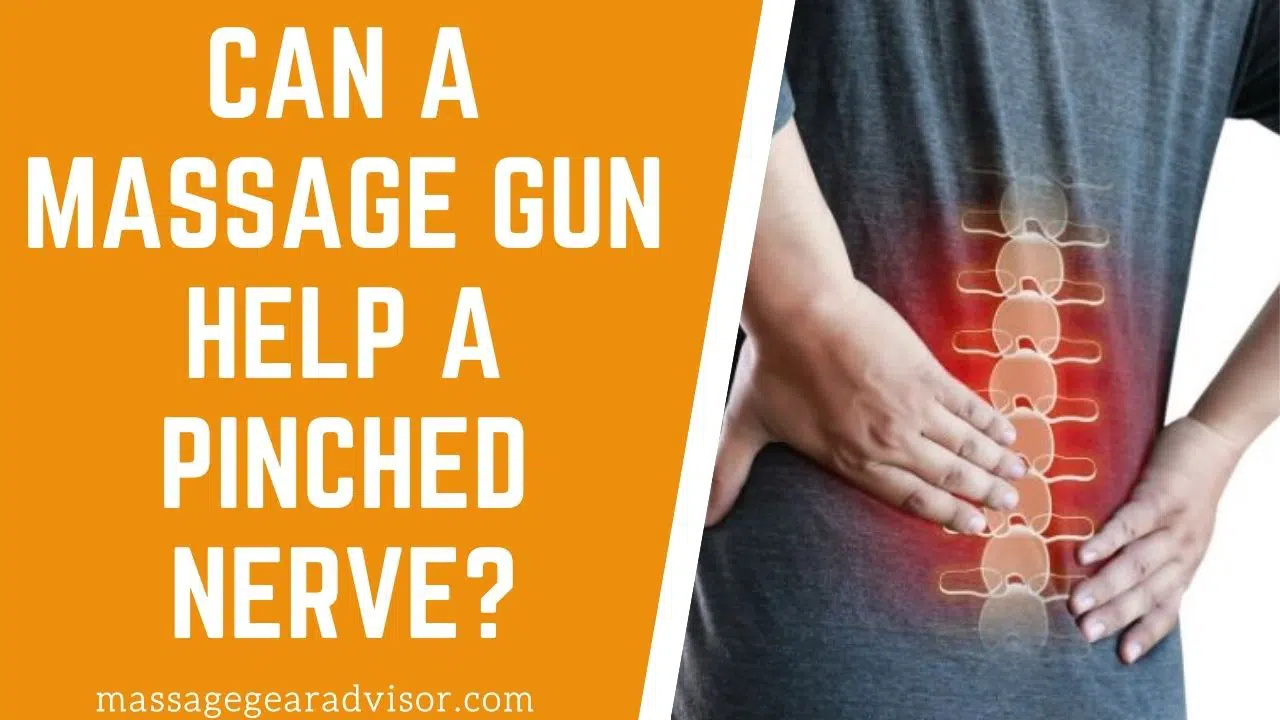
Can a massage gun help a pinched nerve?
A lot of you are wondering if massage would be beneficial on a pinched nerve because oftentimes, they occur on the back, arms, neck, or shoulder (the places mostly targeted with massage).
Maybe you’ve already experienced it yourself that massage can help with certain types of pain and injuries, but the question here is, is a pinched nerve one of them? Well, the answer here is it depends.
Massage on a pinched nerve is often done in adjunct with proper exercises and other treatments. And this can only alleviate the symptoms, but not necessarily heal a pinched nerve.
As a licensed physiotherapist, a lot of patients would often ask me if getting a massage would help their pinched nerve. So, before we dig deeper about massage and its benefits, let us first know what exactly is a pinched nerve.
What is a Pinched Nerve?

A pinched nerve also called radiculopathy, occurs when there is too much pressure on a nerve caused by its surrounding tissues – tendons, muscles, bones, or cartilage, resulting in symptoms such as tingling, numbness, pain, and weakness.
Nerve impingement can occur in various sites in your body. For example – a herniated disc in your spine that compresses a nearby nerve may result in a pinched nerve.
Likewise, when your median nerve becomes compressed at the wrist this may result in carpal tunnel syndrome.
A pinched nerve commonly occurs in the following areas:
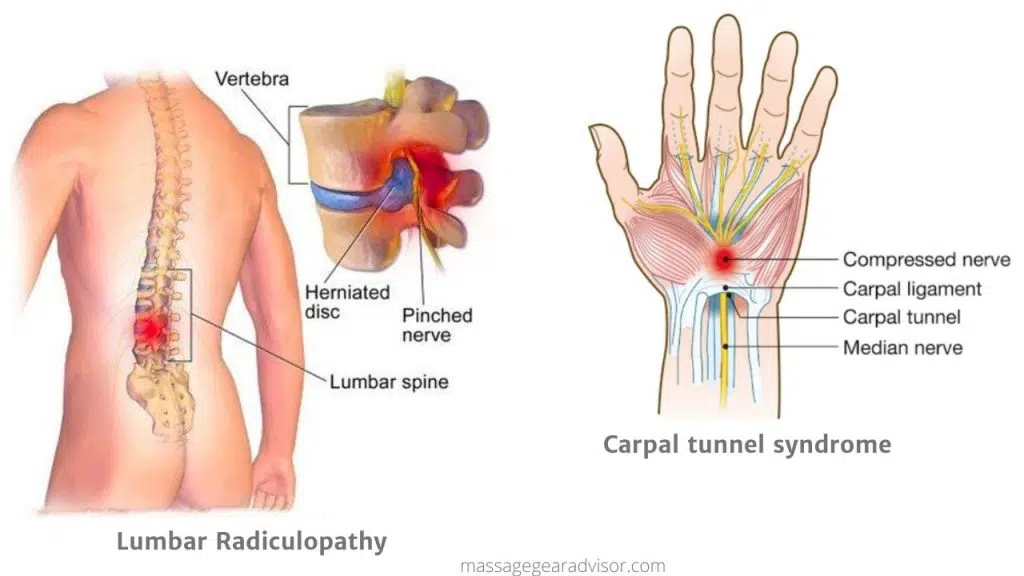
- Cervical – nerve impingement in the cervical region is called cervical radiculopathy. This originates in the neck and often results in a stiff neck followed by pain and numbness that can radiate and affect the shoulder and arm.
- Thoracic – thoracic radiculopathy originates in the upper and middle back that can cause chest pain.
- Lumbar – lumbar radiculopathy can cause pain in the back and hips that usually radiates down the buttock and legs.
- Hand, elbow, and wrist – Carpal tunnel syndrome is a median nerve impingement at the wrist, caused by several factors such as swelling on the wrist due to trauma or injury, repeated use of vibrating hand tools, cyst or tumor in the canal, or fluid retention during pregnancy. On the other hand, cubital tunnel syndrome is the compression of the ulnar nerve at the elbow region due to protracted periods of elbow flexion, a direct blow against the ulnar nerve, or marked valgus or varus deformity of the elbow.
Causes of a Pinched Nerve
Several conditions that may cause nerve impingement are –
- Aging – Wear and tear happen as we grow older; over time the spine becomes stiffer because of a lack of water content, thus making the vertebrae move closer together, resulting in the formation of bone spurs. Once bone spurs develop in the neuroforamen, they can compress the nerves.
- Injury – Sudden injuries acquired from sports or accidents from improper lifting, pulling, or twisting movements can cause a bulging or herniated intervertebral disc.
- Improper posture and body positioning – Prolonged years of practicing bad posture or body positioning such as slouching, sleeping with a too elevated pillow, and improper lifting can contribute to muscle imbalance or nerve compression.
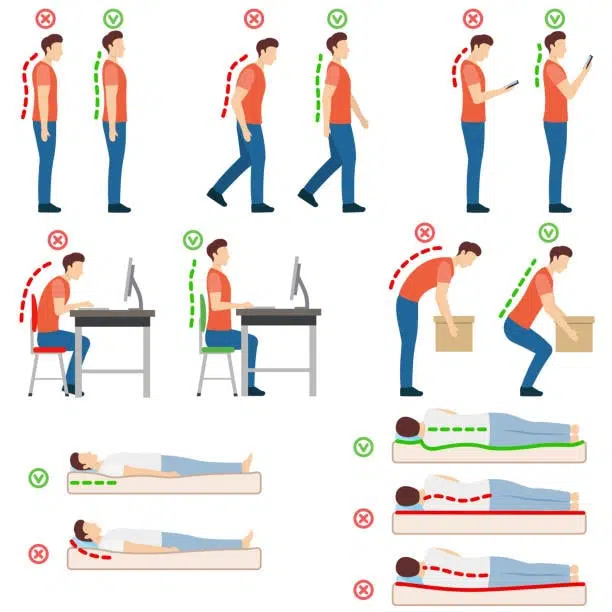
- Rheumatoid arthritis – Joint inflammation, joint pain, and loss of function caused by rheumatoid arthritis may also cause stiffness resulting in nerve compression.
- Overuse – Jobs or hobbies that require repetitive shoulder, hand, or wrist movements. For example, assembly line work or typing on a keyboard for a protracted time can increase your likelihood of having a pinched nerve.
- Obesity – Any extra weight can cause damage to the spine resulting in a pinched nerve.
- Pregnancy – Increased fluid retention in the body can cause nerve compression during pregnancy.
- Diabetes – Although the exact cause of diabetic neuropathy is unknown, according to one study, prolonged high blood glucose levels and high levels of fat (triglycerides) in the blood can damage your nerves. This causes some chemical changes in the nerves, resulting in nerve impairment.
Treatments for a Pinched Nerve
Conservative management (a non-invasive treatment procedure), injections of steroid medicine in the affected area, or surgery (in severe cases) are a few ways a pinched nerve can be treated.
Conservative Management for a Pinched Nerve:
- Time and Rest – Pain from a pinched nerve is often temporary and can be easily treated. In some cases, splints or cervical collars are sometimes prescribed to patients in order to limit their motion as they heal; pain usually subsides in a few days or weeks.
- Hot or Cold Compress – There isn’t enough strong evidence with this but some people find relief when applying a hot or cold pack. Bear in mind that before trying this at home, make sure to seek medical advice first, especially if you have a pre-existing condition that is contraindicated with this method.
- Medications – Nonsteroidal anti-inflammatory drugs (NSAIDs) or some over-the-counter pain relievers can also alleviate the symptoms.
- Massage – Massage can help in muscle relaxation and alleviate the pain. Applying gentle pressure around the affected area may also help in tension relief.
- Physical Therapy – A physiotherapist can help you relieve the pressure on your pinched nerve and alleviate your pain by teaching you appropriate exercises, stretches, proper posture, proper body mechanics, activity modifications, and doing other treatments.
Benefits of Massage on a Pinched Nerve
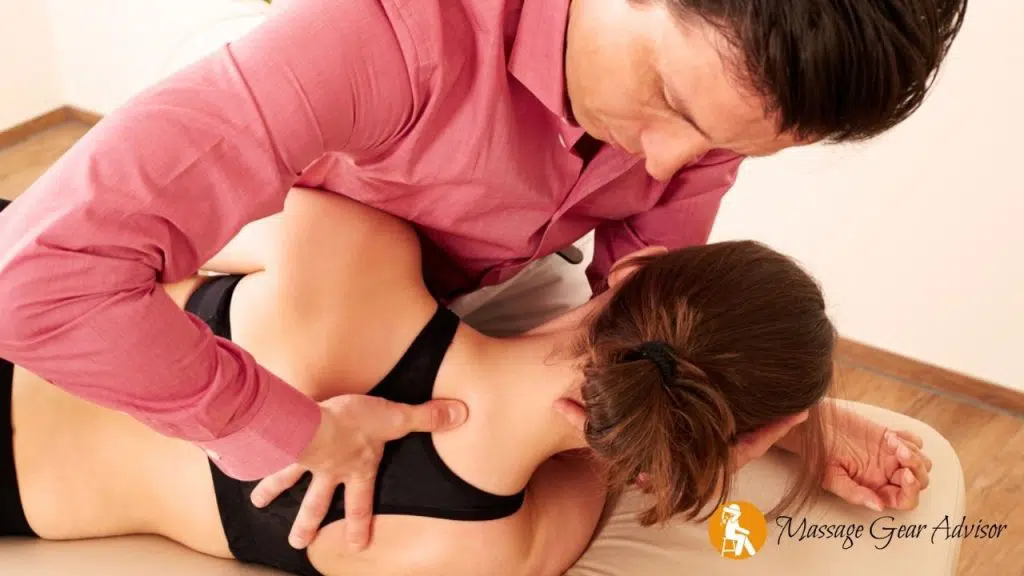
Many people can benefit from massage for a pinched nerve, but some of you might be asking if this would make the condition worse. The answer here is no, especially when it is done by a professional and there is medical advice.
Medications are usually one of the most common treatments given to patients to manage their symptoms – non-steroidal anti-inflammatory drugs (NSAIDs) or pain killers. However, these drugs only give temporary relief and may cause serious damage to your kidneys when taken over a long period.
Therefore, massage is a good alternative treatment to alleviate your nerve impingement symptoms and this could also save your kidneys from serious damage from medications.
According to study research, massage therapy (madenci) combined with a splint and other exercises can significantly increase handgrip strength in patients with median nerve compression – carpal tunnel syndrome (CTS).
Will a Massage Gun Help Pinched Nerve?
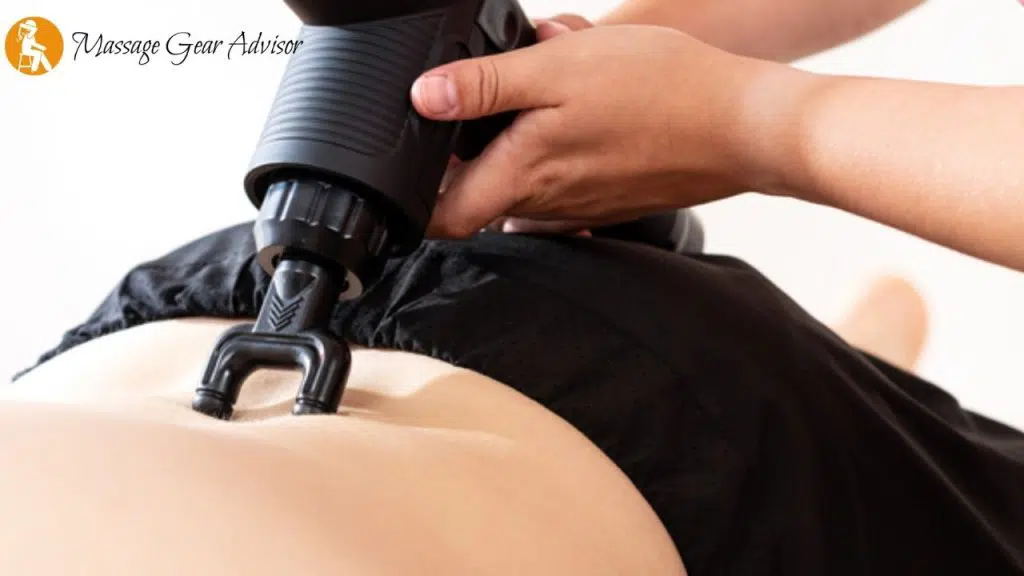
Pinched nerves can make you feel very uncomfortable because of the intense pain it causes. Sometimes this can be unbearable for some people. Therefore, using a massage gun is a great way to temporarily address your pain.
Massage gun uses percussive therapy that helps in relieving muscle knots that sometimes causes pinched nerve. Although this will not eliminate all symptoms, rather it will relieve the pressure on the nerve temporarily by relaxing the muscles and tendons around it.
Do not place the massage gun directly on the pinched nerve or place it for an extended period, as this can make the condition worse by putting further pressure. Instead, use it only around the affected area.
Remember when using a massage gun, always use the appropriate setting and technique based on your case, for this will provide a safe treatment method.
Benefits of using a Massage Gun for Pinched Nerve:
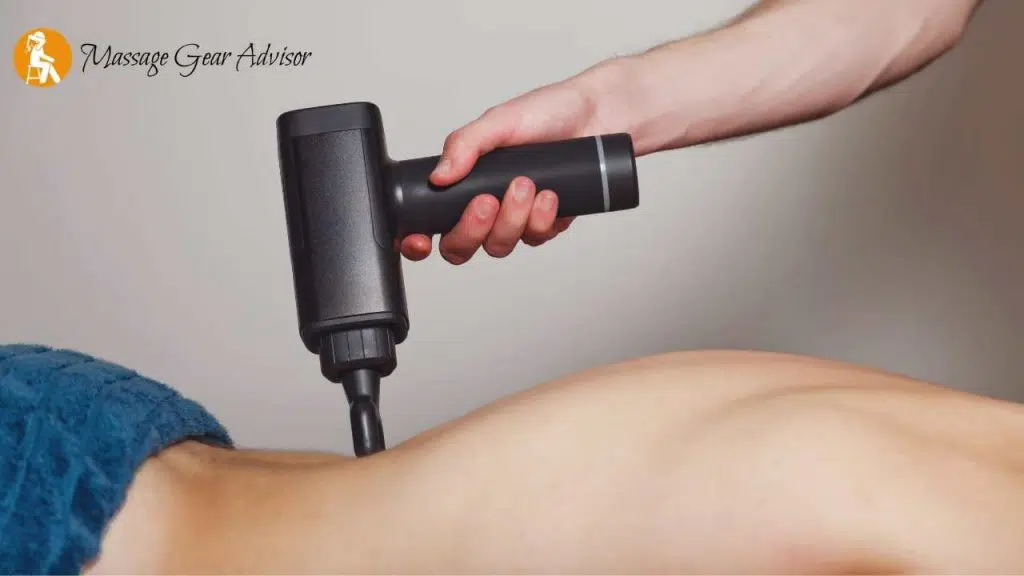
- Reduces and relaxes the tension in your muscles
- Decrease pain and discomfort by relieving pressure on the nerves
- Increases joint mobility
- Improves circulation
However, using a massage gun may seem helpful for you, but before using a percussion massager on a pinched nerve, it is wise to consult your doctor first, especially if you have other existing medical conditions.
Such as –
- Injuries related to inflammation
- People taking warfarin and heparin medications
- Muscle strain, sprain, fractures, osteoporosis, osteoarthritis
- Conditions that affect blood vessels (thrombosis, vascular disease, peripheral artery disease, etc.)
Can using a Massage Gun on a pinched nerve make it worse?
If you use the massage gun properly it will not make your pinched nerve worse.
Remember the keyword here is “Proper technique”. If you use a massage gun on the wrong spot with improper technique, then you may further aggravate the injury.
Keep in mind that you should be extremely cautious when using a massage gun. Make sure to seek medical advice first before using a massage gun or any device for your pinched nerve.
Massage guns should not be used directly on bony areas (spine, collarbone, elbows, hands, knees, ankles, and feet), cartilage, joints, nerves, and tendons. Always use the right setting and opt for a lower intensity (avoid extreme pressure).
Moreover, if you’ve been using it for quite some time and notice that it isn’t doing anything good for your pinched nerve, then you should probably stop.
Thus, if the pain is just getting worse when you use it and other symptoms arise, then immediately stop using it and consult your doctor.
Conclusion
Can Massage Gun Help in a Pinched Nerve?
Yes, but it can only alleviate some of the symptoms and will not completely cure a pinched nerve.
Nerve impingement is a compressed nerve resulting in symptoms such as pain, numbness, muscle weakness, and tingling sensations in which massage can be a good treatment as well. However, putting too much pressure on the affected area may make the symptoms worse.
So, if you are planning on using a Massage Gun to treat your pinched nerve, make sure to seek medical advice first. It is very important to have an appropriate treatment plan for your condition and massage gun best work when combined with exercises, stretches, and other treatments.

AUTHOR
Angeline is a licensed physiotherapist who has a passion for treating patients with different conditions such as musculoskeletal, neurological, cardiopulmonary, geriatric, and pediatric. She is also a part-time makeup artist and owns a small online thrift shop. In her spare time, she loves to travel, explore places, and help her community.

